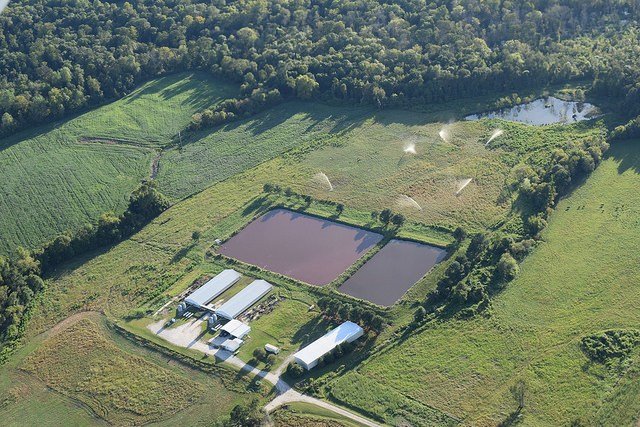Waterkeeper flyovers provide “before” images of N.C. coal ash ponds and animal waste cesspools
By: Waterkeeper Alliance

As Hurricane Florence threatens North Carolina and the southeastern U.S., Waterkeeper Alliance and North Carolina Waterkeeper groups are actively preparing to document the possible impacts of flooded coal ash ponds, industrial hog waste cesspools, and industrial poultry facilities on the state’s waterways.
The organizations performed flyovers Wednesday to document pre-storm conditions at coal ash basins and industrial animal agriculture operations. Images are available on Waterkeeper Alliance’s Flickr page; this album will be updated as we continue our aerial patrols throughout the weekend in the aftermath of the storm. Severe flooding is expected in the Neuse and Cape Fear river basins, which have the highest concentration of industrial swine farms in the state. These facilities store millions of gallons of hog feces and urine in open cesspools; 166 of these cesspools sit in the state’s 100-year floodplain.
Waterkeeper Alliance and Waterkeeper groups are also closely watching coal ash ponds, which could spill directly into the Neuse River, carrying toxic waste downstream.
“Hurricane Florence poses a tremendous threat to the Neuse River,” said Matthew Starr, Upper Neuse Riverkeeper. “During Hurricane Matthew, coal ash ponds at the H.F. Lee Power Plant flooded, spilling toxic coal ash into the river. Since then, not a single shovel of coal ash has been removed from those ponds. Flooding from Hurricane Matthew also spilled waste from feces and urine from massive swine cesspools into our water. As with the coal ash, no action has been taken to remove that threat.” North Carolina environmental agencies permitted swine lagoons and coal ash ponds to be sited in the floodplains of the state’s rivers. Because of this, past storms with high rainfall resulted in devastating pollution to the state’s rivers from coal ash and animal waste. While the state in 1999 began a voluntary buyout program for industrial swine farms, the program’s $18.7 million funding meant that while 138 facilities applied for the buyout, only 43 swine operations in the 100-year flood zone closed.
In 2016, after Hurricane Matthew, Duke Energy’s H.F. Lee Facility in Goldsboro twice released coal ash into nearby waterways, with one breach dumping a one-inch thick layer of coal ash into the Neuse River. A subsequent analysis by Appalachian State University detected dangerous levels of heavy metals, including antimony and cobalt, in a sample from the spill. The flood waters also partially submerged 10 industrial swine operations with 39 barns, 26 large chicken-raising organizations with 102 barns, and 14 open-air cesspools holding millions of gallons of liquid hog manure.
In 1999, the impacts from Hurricane Floyd dumped massive amounts of raw animal waste from industrial meat production facilities into the Neuse River. Sampling conducted after Hurricane Floyd found dangerous levels of E. Coli and Clostridium perfringens in water, even after flood waters receded. Current floods in North Carolina are likely to exceed the record levels set then.
There are 62 industrial swine operations within the state’s 100-year floodplain, housing more than 235,000 hogs. Those operations use open-air cesspools, many larger than Olympic swimming pools, to store swine feces and urine. In addition to the 166 cesspools within the 100-year floodplain, another 366 are within 100 feet of the floodplain. The floodplain is also home to 30 industrial poultry operations, housing more than 1.8 million chickens.
** To arrange interviews or flyovers with Waterkeeper Alliance staff and North Carolina Waterkeepers on the ground and in the air monitoring the conditions, contact: Maia Raposo, Communications & Marketing Director, at [email protected] or (212) 747-0622 x116, or Hailey Bossert, Mixte Communications, at [email protected] or (858) 437-2654.
Upper Neuse Riverkeeper Matthew Starr is available for interviews today and can be reached at [email protected], (919) 856-1180 or 919-961-2240 (cell).**
Click here to read about our North Carolina “Fields of Filth” report and connect to a map of all the poultry and swine farms in North Carolina.